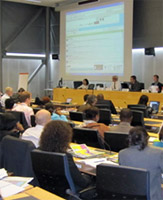UNESCO hosted High Level Debate on Social Networking at WSIS Forum 2010
31-05-2010 (Geneva)

High Level Debate on
Social Networking
© UNESCO
Given increasing popularity of the Internet social networking including blog, wiki, as new tools, media and platforms based on Web2.0 application, UNESCO took an initiative to organize a High Level Debate on Social Networking at WSIS forum 2010 on 11 May 2010 in Geneva, which has triggered lively and fruitful discussions on political and social implications of social networking for knowledge societies.
Given the increasing popularity of new online tools based on Web 2.0 applications, UNESCO organized the High Level Debate on Social Networking on 11 May 2010 in Geneva, Switzerland, which triggered lively discussions on the implications of such networking for knowledge societies. The Debate brought together around 70 participants, including representatives of governments, the private sector and the civil society, as well as legislators, policy makers and Internet users, who exchanged their views on the opportunities and threats of these new tools.
Panellists stressed the tremendous potential of social networking for the promotion of freedom of expression, and political and social cohesion. Social media are indeed unique tools to foster all forms of human rights. In the same time, participants were concerned about online slander and criminal information generated by social media, and their challenge to privacy and data protection.
Panelists presented newly developed legal and regulatory instruments for social networking, such as the Guiding Principles for Social Networking, drafted by the Council of Europe and targeting governments and industries, and the Resolution on Privacy Protection in Social Network Services, adopted by the International Conference of Data Protection and Privacy Commissioners.
The challenge of applying these instruments is linked to the discrepancy of the legal framework between online territory and the real one, especially taking into account social networking’s transnational diffusion. In order to address this challenge, collaboration between private sector, governments and the civil society needs to be fostered. Intergovernmental organizations like UNESCO can play an important role in this process.
In view of active usage of social networking by youth, special attention was paid to the empowerment of young people and their online security. Participants highlighted that social networking greatly benefits young people, enabling them to freely express their views. While there is a need to be cautious of possible self-censorship and filtering, measures should be taken to ensure online privacy and safety.
Other emerging issues addressed during the High Level Debate included social networking through mobile phone in developing countries, ethical standards for social media and their impact on main-stream media, the use of social networking for development and poverty reduction.
In conclusion, the real task is to fully exploit the potential of social networking while not compromising civil rights and liberties, including the right to privacy and right to freedom of expression and freedom of association.
Mr Jānis Kārkliņš, Ambassador of Latvia to France and Permanent Delegate to UNESCO, and coming Assistant Director-General for Communication and Information at UNESCO, chaired the session.
Panellists stressed the tremendous potential of social networking for the promotion of freedom of expression, and political and social cohesion. Social media are indeed unique tools to foster all forms of human rights. In the same time, participants were concerned about online slander and criminal information generated by social media, and their challenge to privacy and data protection.
Panelists presented newly developed legal and regulatory instruments for social networking, such as the Guiding Principles for Social Networking, drafted by the Council of Europe and targeting governments and industries, and the Resolution on Privacy Protection in Social Network Services, adopted by the International Conference of Data Protection and Privacy Commissioners.
The challenge of applying these instruments is linked to the discrepancy of the legal framework between online territory and the real one, especially taking into account social networking’s transnational diffusion. In order to address this challenge, collaboration between private sector, governments and the civil society needs to be fostered. Intergovernmental organizations like UNESCO can play an important role in this process.
In view of active usage of social networking by youth, special attention was paid to the empowerment of young people and their online security. Participants highlighted that social networking greatly benefits young people, enabling them to freely express their views. While there is a need to be cautious of possible self-censorship and filtering, measures should be taken to ensure online privacy and safety.
Other emerging issues addressed during the High Level Debate included social networking through mobile phone in developing countries, ethical standards for social media and their impact on main-stream media, the use of social networking for development and poverty reduction.
In conclusion, the real task is to fully exploit the potential of social networking while not compromising civil rights and liberties, including the right to privacy and right to freedom of expression and freedom of association.
Mr Jānis Kārkliņš, Ambassador of Latvia to France and Permanent Delegate to UNESCO, and coming Assistant Director-General for Communication and Information at UNESCO, chaired the session.
Related themes/countries
· UNESCO and WSIS
· Switzerland
· Weekly newsletter
Share this story:
Contact information
- UNESCO
Source














